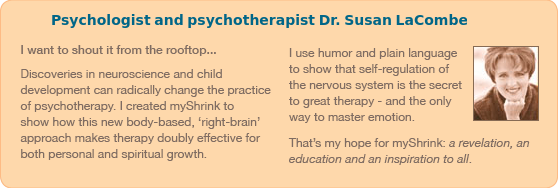How to handle your emotional defences
Your defences are protective
Defense mechanisms are protective, coping strategies adopted by the brain to shield us from painful feelings. You could say the hard part of counseling is in breaking down these defenses.
We all have defenses. Some defenses are more sophisticated than others but all of them are protective mechanisms used by the brain to help us cope.
Defense mechanisms or coping styles develop unconsciously. It is as if a part of the brain has decided "I'm too afraid to feel this."
While defense mechanisms protect us from a core emotion they also rob us from feeling the good aspects of our emotions. In this way they tend to inhibit spontaneity, reduce our flexibility to respond to change and interfere with our capacity to connect with others (see example below).
Many people will recognize (due to the increasing psychologizing in our culture) a few common defenses or styles of coping:
- Denial,
- Rationalization,
- Repression.
- Denial
- Rationalization ("Where would we be, where would any of us be, without good rationalization? Try to live without rationalization; I bet you couldn't do it." Jeff Goldblum in The Big Chill.
- Intellectualisation
- Repression
- Supression
- Regression
- Compensation
- Displacement
- Minimizing
- Sublimation
- Substitution
- Projection
- Identification
- Idealization
- Introjection
- Inversion
- Reaction Formation
- Splitting
- Dissociation
- Somatization
- Undoing, and my favourite...
- Humour
But not all defenses are formally defined.
Some defenses are best identified through our body. For instance, avoiding eye contact with your therapist is also a defense. Feeling like you want to curl up into a ball is another.
Defense Mechanisms are adaptive
Don't be surprised if you discover in your psychotherapy, that you have been using a defense mechanism. Once you appreciate that a defense can also be regarded as a resource, it won't have the same hold over you.
Most defenses develop very early in life. We unconsciously adopt them whenever mutuality in missing in our interactions with our caregivers.
Paradoxically, these early defenses enable an infant to preserve emotional connection with caregivers. In other words, defenses develop because they are adaptive to do so. You see, young, vulnerable infants cannot survive without connection. They will do anything to preserve connection, even at the expense of their own needs.
For instance, when an infant needs to be cuddled and a caregiver was not often available, he or she "learns" that it was better not to feel those impulses. In effect, infants will cope by disconnecting from the need for affection!
Because the defense is learned so early when the nervous system was still developing, it's not easy to recognize (i.e. it feels like a part of you by the time you're an adult) and it's not easy to let go of it once we do see it. The problem arises when as an adult you're continuing to use this same defense. The way the brain functions makes this so.
Using the example above you could imagine for instance, if someone has disconnected from their need for affection how difficult it might be to have a healthy partnership with another who has a balanced need for affection.
A therapy secret for you
Here's a therapy secret for you: you can usually identify a defensive response by observing your reactions to the behavior of others. If you become uncomfortable or upset with a personality 'flaw' of someone else, you may be struggling with aspects of the same source of pain.
And, you may be defended in quite the opposite way.
For example, if you find it difficult to acknowledge your own needs you'll probably feel uncomfortable around someone who openly expresses her own neediness. Moreover, you may even feel repulsed by her!
Both of you are trying to overcome similar early wounds. However, your defensive strategy (quite unconsciously) shows up differently.
As the theory goes...you're uncomfortable because you're being triggered at an unconscious level to re-experience your own neediness and the pain surrounding your own unmet needs.
And this puts your defenses into high gear!
You may notice that you don't like her "for some reason", you just tend to avoid her, or you feel compelled to talk about her in your circle of friends, often without being able to let it go.
"If you hate a person, you hate something in him that is a part of yourself. What isn't part of ourselves doesn't disturb us."
Herman Hesse ('Demian', 1919)
Counseling Tip
If you find yourself reacting this way you might consider raising the issue with your therapist. You'll be tempted to explain why you don't like the trait in that person, but don't get stuck in your left brain rationalizations - move into the right brain and experience it from another perspective!
It is recommended that you move slowly through the feelings that surface. You may feel some sadness underneath, but this is to be expected and is generally a positive sign as you are learning to move through the pain.
Remember that the defense was originally adopted to protect you from emotional pain. As the unconscious becomes conscious through therapy, the pain will subside taking away the need for this defense.
You may be surprised to hear this, but those whom we most despise are actually resources "in potentia". Through their "assistance", uncomfortable feelings are brought to the surface where they can be processed and ultimately let go.
The above is one example of how psychotherapy can move us towards greater interconnectedness and spirituality.
Reviewed by: Dr. Carole Gaato

